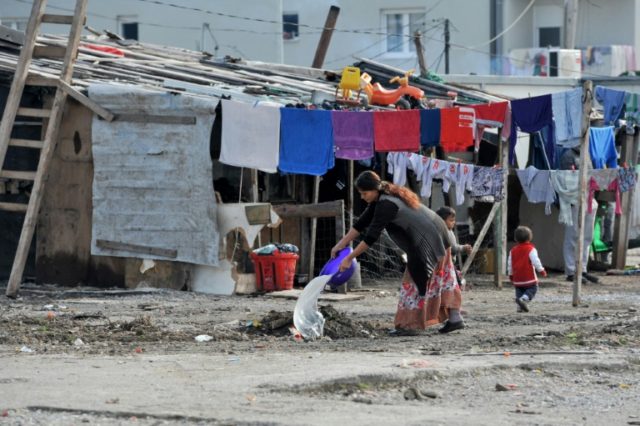Podgorica (Montenegro) (AFP) – It was not their war, but the Kosovo conflict in the 1990s forced tens of thousands of Roma — the Balkans’ eternal scapegoats — into exile.
So for those living in a Roma camp in the capital of neighbouring Montenegro, the 10th anniversary of Kosovo’s independence on Saturday is little cause for celebration.
They fled Kosovo almost 20 years ago for fear of being accused by pro-independence ethnic Albanian rebels of collaborating with Serb forces in the 1998-1999 war that claimed 13,000 lives.
Many Kosovo Roma who stayed were accused, most of them falsely, of such collaboration or other crimes.
Serdjan Baftijari, now 25, says his family paid for “not taking sides” in the war.
He was a child when he left the central ethnic Serb enclave of Gracanica in the summer of 1999, as the tide of the conflict was turning.
A NATO bombing campaign was forcing Serb troops out of the breakaway territory. The ethnic Albanian Kosovo Liberation Army (KLA) was taking control.
“We lived in a majority-Serb area. We were scared,” Baftijari said.
Now he is among about 2,000 people living in the camp in the suburb of Konik in Podgorica.
Most of them recently moved into apartments but about 60 families remain in converted containers or huts.
Children play in the rubbish and the communal water pipes where residents fill up their cans are leaking.
– ‘Serious abuses’ of Roma –
Kosovo Roma were victims of “serious abuses” during the war, according to the Belgrade-based Humanitarian Law Centre (HLC), a prominent non-governmental organisation in the Balkans.
They were sometimes forced by Serbs “to bury the bodies of Albanian civilians and KLA members, to dig trenches for the military, and to pillage and destroy ethnic Albanian property,” it said in a 1999 report.
Today there are about 35,000 Roma in Kosovo, said Gazmen Salijevic, a Roma activist in Kosovo. Several thousand refugees have returned there, but the number is still far from the estimated 100,000 or more who lived in Kosovo before the war.
Those who did not flee faced danger — HLC’s Kosovo branch said that 240 Roma were either killed or went missing in the war.
“The Roma were collateral damage in all the conflicts in former Yugoslavia,” said Salijevic.
“It is easy to attack us. We have nobody to back us, no state, no system to protect us.”
With aid from the European Union, Montenegro has ramped up the construction of apartments in the camp. The goal is to eradicate provisional facilities in 2018.
But that will not end the inhabitants’ social isolation, said Elvis Berisha of the Walk With Us youth organisation, which campaigns for Roma education.
“Of course it is better to live in an apartment than in a container,” he said. But among the locals, he says, the camp has come to be known as a place for “garavi” — an insulting term for Roma.
– ‘Never return to Kosovo’ –
Ferdi Bahtiri’s family is one of about 50 at the camp waiting to be relocated.
In the meantime, the 28-year-old has set up two containers to live in with his wife and their five children. For money, he unloads trucks at a market in Podgorica, earning between five and 15 euros ($6-18) a day.
The camp’s shared toilets are unusable. The Bahtiris use the ones at the home of their cousins, who were fortunate enough to be relocated to an apartment.
A native from the northern Kosovo town of Mitrovica, Bahtiri is convinced that this unhygienic environment caused the liver cirrhosis suffered by his youngest daughter, 18-month-old Aida. She needs treatment abroad but he cannot afford it.
Like Baftijari, he had to briefly return to Kosovo to get a passport and avoid becoming stateless. Few of these refugees have managed to obtain Montenegrin nationality.
Despite the harsh conditions of life in the camp, Bahtiri said he “will never return to Kosovo”.
“My children were born here. My parents were buried here,” he said.
“I do not know anyone there anymore.”

COMMENTS
Please let us know if you're having issues with commenting.